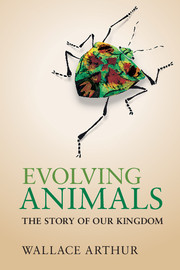Book contents
- Frontmatter
- Dedication
- Contents
- Preface
- Acknowledgements
- 1 What is an animal?
- 2 Before there were animals
- 3 How to make a fossil
- 4 The Cambrian explosion
- 5 How to make a species
- 6 Jellyfish and their kin
- 7 How to make a tree
- 8 The enigmatic urbilaterian
- 9 Animal symmetry and heads
- 10 A plethora of worms
- 11 Trends in animal complexity
- 12 Where the octopus is king
- 13 How to make an animal
- 14 Exoskeletons galore
- 15 Extinction
- 16 Mouth first, mouth second
- 17 Comparing embryos
- 18 Larvae, mouthparts and moulting
- 19 The animal toolkit
- 20 Vertebrate origins and evolution
- 21 From water to land to water
- 22 Variation and inheritance
- 23 Evolutionary novelties
- 24 Human origins and evolution
- 25 Animal plasticity
- 26 The nature of adaptation
- 27 The direction of evolution
- 28 Animal extremophiles
- 29 Extraterrestrial animals?
- 30 The ghost in the machine
- Appendix
- References
- Index
12 - Where the octopus is king
Published online by Cambridge University Press: 05 August 2014
- Frontmatter
- Dedication
- Contents
- Preface
- Acknowledgements
- 1 What is an animal?
- 2 Before there were animals
- 3 How to make a fossil
- 4 The Cambrian explosion
- 5 How to make a species
- 6 Jellyfish and their kin
- 7 How to make a tree
- 8 The enigmatic urbilaterian
- 9 Animal symmetry and heads
- 10 A plethora of worms
- 11 Trends in animal complexity
- 12 Where the octopus is king
- 13 How to make an animal
- 14 Exoskeletons galore
- 15 Extinction
- 16 Mouth first, mouth second
- 17 Comparing embryos
- 18 Larvae, mouthparts and moulting
- 19 The animal toolkit
- 20 Vertebrate origins and evolution
- 21 From water to land to water
- 22 Variation and inheritance
- 23 Evolutionary novelties
- 24 Human origins and evolution
- 25 Animal plasticity
- 26 The nature of adaptation
- 27 The direction of evolution
- 28 Animal extremophiles
- 29 Extraterrestrial animals?
- 30 The ghost in the machine
- Appendix
- References
- Index
Summary
Always beware the use of ‘king’ for an animal. What do we mean when we invoke that old adage that the lion is the king of the beasts? Nothing very precise, for sure. Perhaps we mean that, as a ferocious predator, the lion is king of all the mammals of the African plains. It’s a top predator: it eats many of them, but none of them eat it – at least when it is still alive. And what do we mean when we call one penguin a king, especially when there are emperor penguins too?
In calling the octopus a king in this chapter, I am not referring to its predatory habits, its size or its regal appearance, but rather to its brain. In a sense, the octopus is a king more like the human than the lion. But what is it king of, in this respect? Possibly of all the invertebrates; but I’m going to focus here on the realm of the molluscs. As you’ll recall, the highest conventional level of group within the animal kingdom is the phylum (plural, phyla). We’ve already looked at several of these. Our own phylum, the Chordata, is mostly composed of the vertebrates, though it also includes a few close relatives that lack our characteristic spine. In Chapter 1, we saw that the vertebrates made up less than 5% of the animal kingdom, with their 50,000 or so species. The largest phylum by far in terms of species numbers is the Arthropoda, where the biggest constituent group (insects) represents, on its own, about three quarters of all animals.
- Type
- Chapter
- Information
- Evolving AnimalsThe Story of our Kingdom, pp. 113 - 122Publisher: Cambridge University PressPrint publication year: 2014



